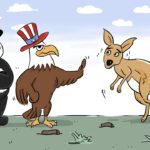US Secretary of State Mike Pompeo was exceptionally impressed when he welcomed Marise Payne and Linda Reynolds, Australia’s minister of foreign affairs and minister of defense, in Washington DC for the 2020 Australia-US Ministerial Consultation (AUSMIN) on July 28.
The timing suited Pompeo well as the Trump administration makes a huge mess in its disastrous handling of the COVID-19 epidemic and faces national crisis. Indeed, the Black Lives Matter movement has been raging into a cathartic outburst of collective anger. It has heightened political tension and reduced cities like Portland to a razed battleground that is almost like a civil war.
Meanwhile, instead of fixing domestic problems, Pompeo has been invidiously resorting to a despicable trick of shifting the blame of US national tragedies onto others by inventing imagined external threats in order to deflect public grievances away from the White House.
China has therefore been preyed upon as a demonized enemy, a scapegoat for public hanging at a scaffolding. With his infamous speech at the Richard Nixon Presidential Library and Museum calling for a multinational anti-China coalition, Pompeo was desperate to rally outside support, especially from its traditional allies. The annual AUSMIN meeting was a timely occasion.
However, what Pompeo and US Secretary of Defense Mike Esper hadn’t foreseen was that during and after the AUSMIN consultations, for all the lip services to align with the Americans’ scheme to contain, suppress and crush China, Reynolds did not directly respond to the US pressure on Australia to join the so-called freedom of navigation exercises in the South China Sea, and only said it was a “subject of discussion.” Australia still appears to be resisting the US’ push. They obfuscated about how they would or would not join the anti-China united front.
Payne reiterated that Australia had its own position, and that Australia’s national interests meant it made its own decisions independently from the US secretary of state. She went on to accentuate Australia’s relations with China by saying, “The relationship we have with China is very important, and we have no intention of injuring it.”
Australia has been an active player in the Asia-Pacific region. It was the initiator of the Asia-Pacific Economic Cooperation forum.
Contrary to sense and sensibility, since the mid-2017, Canberra has been making a series of injurious steps to escalate tensions between itself and Beijing. This is especially true for a number of maneuvers synchronized with the anti-China ploys designed by Washington. A reckless campaign to sabotage Australia’s productive and mutually beneficial relations with China has been consistently waged in a variety of fronts, which asininely serves only the interest of US President Donald Trump and his failing leadership.
Categorically trailing along with Trump’s irrational anti-China strategies won’t win any true respect from Washington and the international community. Canberra’s best hope of reward from the White House would be a pat on the back by Trump or Pompeo.
But what it would unfortunately lose is its long-standing friendship and mutually beneficial partnership with China. Given the prospect of uncertainties in the US politics, how can Canberra continue to be ensnared in the deceptive illusion that it could profit from irrationally provoking and confronting China?
With the prospect of a global economic slump as the aftermath of the ongoing COVID-19 pandemic, this is certainly not a time for Australia to join America’s insidious plot to start a new cold war with China. In fact, 46 percent of Australia’s export has been to China, which testifies to the truth that the comprehensive strategic partnership between the two countries does have a shared future. It is indeed substantially profitable.
China respects and supports Australia’s independence in policymaking with regard to international politics and diplomacy, economic cooperation and cultural diversity. It is time for Australia to be assertive in its own international policy and, as Payne judiciously said, to “make our own decisions, our own judgments in the Australian national interest”.
The author is a professor and director of Australian Studies Center, East China Normal University. opinion@globaltimes.com.cn
Photo: Xinhua


